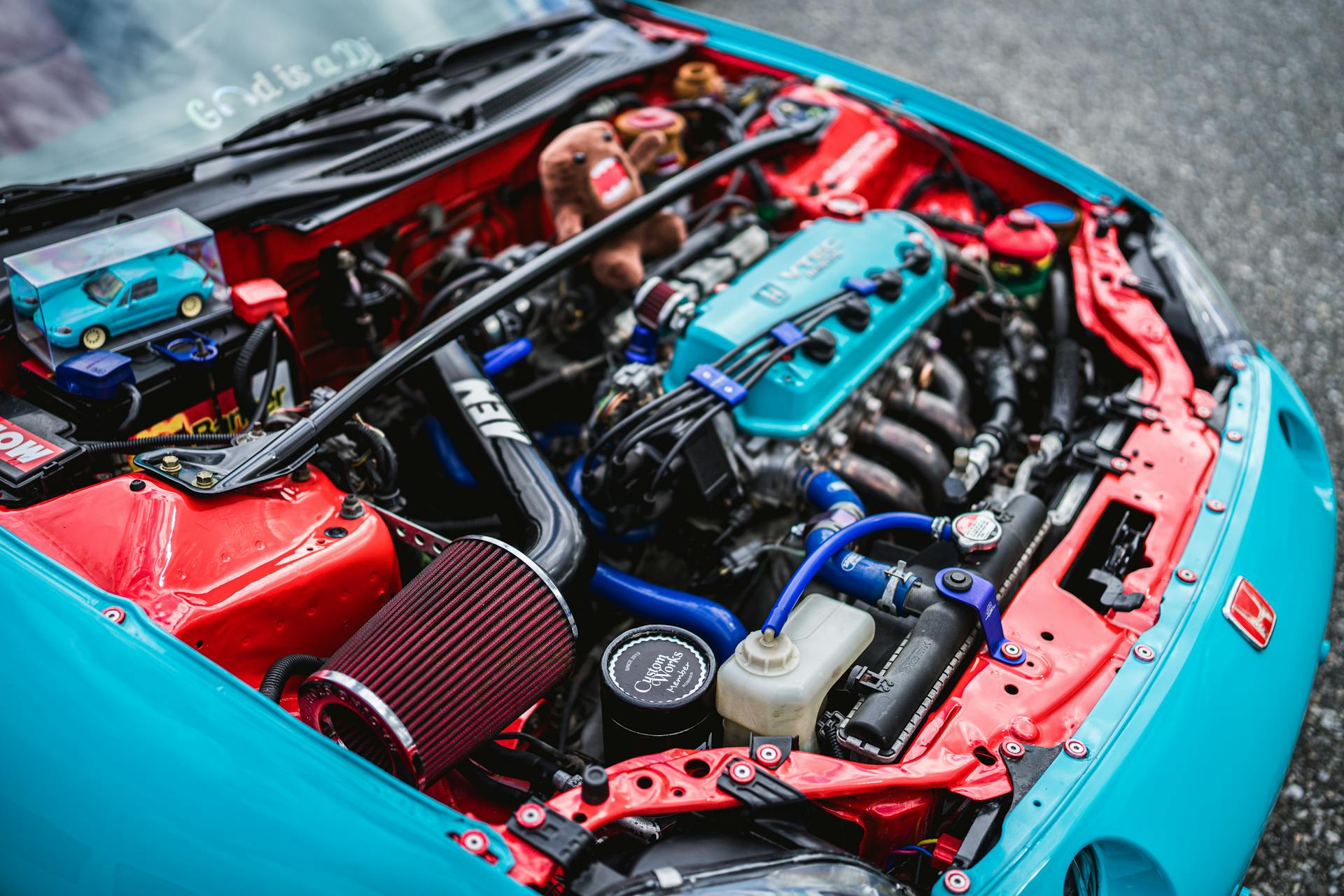Is Tuning Legal in California
Car tuning is legal in California, but it must comply with strict California Air Resources Board (CARB) regulations. Any performance modifications that affect emissions require CARB certification and an Executive Order (EO) number to be street-legal. Common illegal modifications include non-compliant exhaust systems, engine remapping without approval, and certain turbochargers. Vehicles that fail emissions tests may be fined or even impounded.
Understanding Vehicle Modification Laws
California’s vehicle modification laws are a complex web of regulations that any car enthusiast should understand before starting on the journey of tuning. These laws have been established primarily to guarantee vehicle safety and to control emissions, while also allowing for performance enhancements to a certain extent.
The vehicle safety regulations primarily focus on the structural integrity of the car, the effectiveness of its safety features, and the impact of any modifications on the vehicle’s handling and performance. For instance, any changes to the suspension should not compromise the stability of the vehicle. Similarly, any enhancements to the engine performance should not negatively affect the braking capacity of the car.
The performance enhancement-related regulations, on the other hand, limit the extent to which a vehicle’s engine can be modified. These laws guarantee that the vehicle’s emissions remain under the permissible level, even after modification. They also mandate the use of certain parts and equipment that meet the state’s stringent safety and emission standards.
Understanding and adhering to these laws is vital for car enthusiasts planning to modify their cars in California, to avoid legal complications and guarantee the safety of the vehicle and its occupants.
Legal Aspects of Engine Tuning
In examining the legal aspects of engine tuning in California, it is essential to understand the state’s specific tuning regulations. Additionally, comprehending the potential penalties for non-compliance provides an imperative frame of reference for car enthusiasts considering modifications. These two elements form the cornerstone of the legal framework surrounding engine tuning within the state.
California’s Tuning Regulations
| Legal Modifications | Illegal Modifications |
|---|---|
| CARB-approved engine tuning | Non-CARB aftermarket exhausts |
| Smog-compliant turbochargers | Modified catalytic converters |
| Aesthetic upgrades (paint, lights) | Excessively loud exhausts (>95 dB) |
Despite the widespread popularity of car tuning among vehicle enthusiasts, it is crucial to understand the legal landscape before making any modifications to a vehicle’s engine in California. The state has specific regulations governing the use of aftermarket parts and performance upgrades to guarantee public safety and environmental protection.
In California, modifications using aftermarket parts must pass the California Air Resources Board (CARB) certification. This legislation guarantees that any performance upgrades do not adversely affect the vehicle’s emissions. The CARB certification applies to a range of components, including exhaust systems, intake systems, turbochargers, and superchargers.
Furthermore, any aftermarket parts used for performance upgrades must carry an Executive Order (EO) number. This number signifies that the part has been tested and approved for use by CARB.
Nonetheless, not all modifications require this certification. For example, aesthetic enhancements like new paint jobs or changes to the interior are generally exempt from these regulations.
Penalties for Non-compliance
While the state of California promotes automotive innovation, it also firmly upholds regulations designed to protect public health and the environment. Non-compliance with these rules can result in hefty penalties. This is true for individuals who perform engine tuning without the appropriate tuning permits and for businesses that fail to follow stringent compliance checks.
Individuals found in violation of California’s tuning regulations may face fines upwards of $1,000 per violation. Repeat offenders may see fines increase and potentially face criminal charges. In addition, vehicles found non-compliant may be impounded until they meet the state’s emission standards.
Businesses that perform tuning services without the proper permits or fail compliance checks can also face severe penalties. These can range from monetary fines to suspension or even revocation of their business license.
The state’s Bureau of Automotive Repair (BAR) conducts regular compliance checks to guarantee adherence to these regulations. Consequently, both individuals and businesses are encouraged to familiarize themselves with the state’s tuning regulations and to obtain necessary permits before undertaking any tuning activities.
In short, while California supports automotive customization, it does so with a keen eye on maintaining public health and environmental safety.
Emission Standards for Tuned Cars
California is renowned for its stringent emission laws, which greatly impact the legality and requirements of car tuning. Tuned cars, often optimized for performance, may potentially exceed emission limits, resulting in non-compliance with state regulations. The ensuing section will discuss the legal consequences of non-compliance, and how these regulations shape the tuning scene in California.
California’s Stringent Emission Laws
It’s imperative to understand the stringent emission laws in California, especially if you’re considering tuning your car. These laws are enforced to guarantee that vehicles contribute minimally to air pollution, a notable issue in the state.
California’s emission laws are among the strictest in the United States. Their legislation, enforced by the California Air Resources Board (CARB), requires all vehicles to undergo regular emission testing, often referred to as smog checks. These checks are performed to measure the pollutants a vehicle emits.
The emission testing process is thorough. It involves a visual inspection of the emission control components and systems, a functional inspection of the vehicle’s check engine light, an On-Board Diagnostic (OBD) system test, and, in some instances, a tailpipe smoke test.
Smog checks are mandatory for all vehicles, with few exceptions. Diesel-powered vehicles, hybrids, electric cars, motorcycles, and trailers are exempt from this requirement. However, cars that are six or less model years old pay an annual smog abatement fee for the first six registration years instead of requiring a biennial smog check.
Understanding these regulations is essential, particularly for those considering tuning, as modifications can meaningfully impact a vehicle’s emissions.
Impact on Tuned Cars
In light of these stringent emission regulations, the impact on tuned cars in California is considerable. The state’s rigorous emission standards often limit the extent to which car enthusiasts can legally modify their vehicles, especially when it comes to performance upgrades.
Tuning benefits are commonly sought after for enhancing vehicle power and efficiency. However, the alterations, such as engine remapping or the addition of high-performance parts, can result in increased emissions, contradicting California’s environmental objectives. As a result, these modifications may not comply with California’s emission standards, inhibiting the potential for vehicle enhancement.
Car enthusiasts may find it challenging to balance between adhering to the state’s emission laws and achieving the desired performance upgrades. The legal tuning options available often involve trade-offs, such as sacrificing some performance for lower emissions. This situation creates a complex environment for car owners who must navigate this intricate landscape to enjoy the benefits of tuning while remaining within the law.
Consequently, while tuning potentially offers numerous benefits, California’s stringent emission standards considerably impact the extent to which cars can be legally modified, particularly concerning performance upgrades. This situation necessitates a careful approach to vehicle tuning in the state.
Legal Consequences for Non-Compliance
Maneuvering the complex domain of car tuning in California without adhering to the state’s stringent emission standards can lead to significant legal consequences. The state enforces strict vehicle compliance laws to control air pollution, and non-compliance can result in hefty fines, penalties, or even vehicle confiscation.
At the heart of tuning legality in California, the Bureau of Automotive Repair (BAR) plays a crucial role. Any adjustments to a vehicle’s emissions system must first be approved by the BAR. If not, the owner is held liable for non-compliance, facing penalties that can range from $100 to $25,000 per violation. Additionally, vehicles found non-compliant during smog checks could be ‘red tagged’, effectively prohibiting their operation on public roads.
The state also empowers local law enforcement agencies to conduct roadside inspections. If a tuned vehicle is found to exceed California’s strict emission standards, the driver may be subject to immediate penalties. These can even extend to vehicle impoundment in extreme cases.
Thus, understanding and adhering to emission standards is essential when tuning cars in California. The repercussions of non-compliance underscore the severity of the state’s commitment to environmental protection.
How Exhaust Modifications Fare
Maneuvering the complex universe of vehicle modifications, one might question the legality of exhaust alterations in the state of California. The state’s stringent emissions standards extend to the domain of exhaust modifications, therefore the legality is determined by several factors.
- Exhaust Sound: California law prohibits any modifications that amplify or alter the exhaust sound to exceed 95 decibels, as measured by the Society of Automotive Engineers (SAE) standard J1169. Violation can result in a fine, and the vehicle owner is required to correct the violation.
- Performance Gains: While many seek to boost performance gains through exhaust modifications, it’s critical to ascertain these changes do not increase harmful emissions and that they comply with California’s Air Resource Board (CARB) regulations.
- CARB Certification: Any aftermarket part, including exhausts, must bear a CARB Executive Order (EO) number, proving that it meets emission standards.
- Smog Check: Altered or not, all vehicles in California must pass a biennial smog check. Any changes that result in a failed check must be corrected and the vehicle retested.
Understanding these rules can help enthusiasts enjoy their passion legally and responsibly.

Suspension Modifications: What’s Allowed?
While many car enthusiasts might be primarily focused on enhancing speed or power, it’s vital to remember the importance of suspension modifications in the quest for improved performance, especially in California. The state’s regulations for these modifications are stringent and must be adhered to avoid penalties.
California law permits changes to suspension types, provided they comply with safety standards. Modifications can range from altering spring rates, damping forces, or even switching to an entirely different suspension system. However, it’s important to ascertain your modifications don’t adversely affect the vehicle’s stability or pose a risk to other road users.
Another significant aspect to take into account is the ride height. California Vehicle Code Section 24008 stipulates that it’s illegal for any part of a vehicle’s body or chassis to be lower than the lowest part of the rim of any wheel in contact with the roadway. This means alterations that drastically lower your vehicle may not be permissible.
Impact on Car Insurance Rates
A considerable number of car modifications can potentially lead to an increase in car insurance rates, particularly in California. The insurance implications of tuning and modifying your vehicle can be substantial, often necessitating coverage adjustments to reflect the increased risk associated with these changes.
- Higher Premiums: Insurance companies may raise your premiums if your vehicle is modified, as they view modified vehicles as a higher risk. This is because such vehicles are more likely to be involved in accidents or targeted for theft.
- Denial of Claims: In some cases, an insurance company may deny a claim if it finds out that the car has been modified without their knowledge. This is why it’s essential to inform your insurer about any modifications.
- Extensive Coverage: If your modifications greatly increase the value of your vehicle, you may need to adjust your policy to guarantee that you have enough extensive coverage to replace the vehicle in case of total loss.
- Liability Coverage: Modifications that increase your car’s speed or performance may require increased liability coverage to protect you financially in case of an accident where you’re at fault.
Understanding these insurance implications and making necessary coverage adjustments is vital when tuning your vehicle in California.
Tips to Legally Tune Your Vehicles
The process of legally tuning your vehicle in California can be a complex task, but a few key strategies can help to guarantee compliance with state regulations.
The first step is to ascertain that any performance upgrades meet California’s stringent emissions standards. This means that when upgrading your vehicle’s engine or exhaust system, it is vital to seek parts that are CARB (California Air Resources Board) approved.
Next, consider professional tuning techniques that prioritize fuel efficiency and reduced emissions. Remember, the goal isn’t just to enhance speed or power, but to make modifications that meet state standards while improving your vehicle’s performance. Keep in mind, altering the car’s computer system for performance can lead to violations if not done properly.
Lastly, always consult with a professional tuner who understands California’s specific laws and regulations. Their wisdom and experience can guide your process and confirm that your modifications are legal, safe, and effective. Following these steps carefully will not only keep you within the law’s boundaries but also greatly improve your vehicle’s performance. Remember, legal tuning doesn’t have to compromise the thrill of improved vehicular performance.
Frequently Asked Questions
To legally tune your car in California, ensure all modifications comply with CARB (California Air Resources Board) regulations. Use CARB-approved aftermarket parts with an Executive Order (EO) number, pass smog checks, and avoid modifications that increase emissions or violate noise limits.
Illegal tuning in California can result in fines up to $1,000 per violation, potential vehicle impoundment, and the requirement to restore the vehicle to compliance. Businesses performing illegal tuning may face higher fines, license suspension, or legal action.
Yes, all emissions-related performance parts must have CARB approval and an Executive Order (EO) number to be street-legal in California. However, cosmetic modifications like paint, body kits, and interior changes do not require approval.
Yes, tuning can potentially affect your car’s warranty. Warranty implications depend on the manufacturer and the extent of tuning. Any modifications that cause damage may void the warranty, depending on the tuning restrictions outlined by the manufacturer.
In California, it is not necessary to inform law enforcement about car modifications or tuning. However, make certain your modifications comply with state regulations to avoid potential violations and legal repercussions.
In various states, illegal modifications often involve performance enhancements that violate emissions regulations. These can include certain exhaust systems, engine swaps, and alterations to the vehicle’s fuel system or emission control components.
Yes, tuning can greatly enhance a car’s fuel economy. Through precise adjustments to the engine management system, performance gains are achieved, which can lead to improved fuel efficiency and potentially lower vehicle operating costs.






